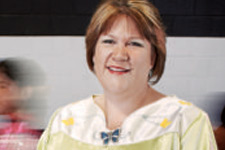Alumna looks to end ‘isolation’ for others
By Adela Talbot, BA'08, MA'11

When Christy Bressette first stepped onto Western’s campus more than two decades ago, it was “an isolating experience.”
“There was no support, like we have now, in place for Indigenous students,” said Bressette, an Anishinabe member of Kettle and Stony Point First Nation. “It was a challenging experience where I didn’t feel accommodated, where I didn’t feel my perspectives were visible anywhere in the curriculum, the classroom or anywhere on campus.”
Thankfully, this won’t be the case for an incoming student today, Bressette added. She is thrilled to play a role in ensuring a welcoming campus community for all Canadian students.
Bressette, BA’95 (Brescia), BEd’96, PhD’08, will partner with Alan Weedon, Special Advisor to the Provost and former Vice-Provost (Academic Planning, Policy & Faculty), as co-chairs of the university’s task force to implement its new Indigenous Strategic Plan.
“It was a challenge to study History at Western. Everything I learned in those classes was almost devoid of Indigenous perspectives,” said Bressette, the first Indigenous person to receive a doctorate degree from Western. “I had a double standard when I studied – I had to study the curriculum and complete expectations, but I had my own standards. Not only did I have to do all that, but I also had to find, introduce and validate the Indigenous perspective back into history.”
“Many of my professors at the time applauded my efforts and said this hadn’t been done, and that it enriched the class. I felt motivated to continue to raise awareness,” added Bressette, who has worked as the Coordinator of Indigenous Education for the Council of Ministers of Education in Canada for nearly a decade.
A trained educator who has taught at diverse schools at all levels, Bressette knows education is a “tremendous place to facilitate healing through learning opportunities for all Canadians.” Her personal and professional experiences are the reason she looks at Western’s Indigenous Strategic Plan with optimism and enthusiasm.
“Across Canada, because of the Truth and Reconciliation Commission, universities are looking at how best to do this kind of work. I’m pleased to see Western poised to do this in a good way. Efforts have been made before to ‘Indigenize’ the academy in a way that things have always been done before – top down and imposed,” she explained.
“But what I appreciate about Western is the whole process was devised with a tremendous level of consultation with Indigenous communities, students, key faculty and the overall population of the university. That makes a big difference. It’s a better way, a decolonized approach, where everyone has an opportunity. And when you approach this in a decolonized way, you’ll have more success. It will be more impactful and meaningful.”
The challenge in implementing such a plan, and generally supporting Indigenous students across Canada, Bressette said, is making sure everyone starts on the same page when it comes to understanding issues facing Canada’s Indigenous communities.
“All Canadians are in different places when it comes to their level of understanding of what really happened in Canada. People don’t always appreciate or understand why Indigenous people might live in the conditions they do. If we are expecting to start this work and assume everyone is on the same page, that will be a challenge – there can be resistance,” she said.
Western and the task force will involve many perspectives in the plan’s implementation. Bressette is confident awareness will be fostered in the process.
“I’m happy about this, especially when I have children getting ready to think about their postsecondary education. Now that I know things have improved, I’m keen to see them go where they choose because I feel they will be afforded more sensitive and appropriate supports that, unfortunately, I didn’t have at the time,” she said.
“I believe my giftings have helped me bring awareness to these issues and support all Canadians, and that has brought me to this opportunity where I can lend that to help today’s Indigenous students walking a similar path. Making it better for them makes all my work so worthwhile. I’m grateful, honoured and humbled to be asked to help support this.”
